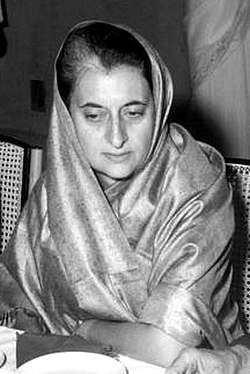P. N. Haksar
| P. N. Haksar | |
|---|---|
 | |
| Deputy Chairman of the Planning Commission | |
|
In office 4 January 1975 – 31 May 1977 | |
| Prime Minister | Indira Gandhi |
| 1st Principal Secretary to the Prime Minister of India | |
|
In office 6 December 1971 – 28 February 1973 | |
| Prime Minister | Indira Gandhi |
| Preceded by | Office established |
| Succeeded by | V. Shankar |
| 2nd Secretary to the Prime Minister of India | |
|
In office 1967 – 5 December 1971 | |
| Preceded by | Lakshmi Kant Jha |
| Succeeded by | Office temporarily abolished |
| Personal details | |
| Born |
Parmeshwar Narayan Haksar 4 September 1913 Gujranwala, Punjab, British India (now in Pakistan) |
| Died |
25 November 1998 (aged 85) New Delhi, Delhi, India |
| Spouse(s) | Urmila Sapru |
| Children | Nandita Haksar, Anamika Haksar |
Parmeshwar Narayan Haksar (4 September 1913 – 25 November 1998) was an Indian bureaucrat and diplomat, best known for his two-year stint as Prime Minister Indira Gandhi's principal secretary (1971–73). In that role, Haksar was the chief strategist behind his inexperienced prime minister's rise to near-absolute power in the mid-1970s. After this he was appointed deputy chairman of the Planning Commission and then the first-ever chancellor of New Delhi's Jawaharlal Nehru University.
An advocate of centralization and socialism, he was a Kashmiri Pandit who became Gandhi's closest confidant in her inner coterie of bureaucrats, the "Kashmiri mafia". Prior to this, Haksar was a diplomat of the Indian Foreign Service, who served as India's ambassador to Austria and Nigeria.
Personal life
Haksar was born in 1913, Gujranwala (now in Pakistan) in a Kashmiri Pandit family. He studied Sanskrit at home and obtained an M.Sc. from Allahabad university, Uttar Pradesh. He went on to study in the London School of Economics.[1] As a student of Allahabad university, he was a resident of Mayo Hall & made frequent visits to the Anand Bhawan, the house of Motilal Nehru.[2] Parmeshwar was a voracious reader of art history & also a connoisseur of paintings.[2] During his interlude in London, UK, he was influenced by Socialism and become associated with the Marxists.[1][2]
During the latter years of his life, Haksar became associated with the Delhi Science Forum, initiatives on human rights, and opposition to neoliberal policies and secularism. He lost his eyesight during the last 10 years of his life. Haksar died at the age of 85, on 25 November 1998.[3]
Career

Early career
Haskar had already made his mark as a lawyer in Allahabad, before he was selected in the Indian Foreign Service in 1947,[4] and was quite close to fellow-Kashmiri-from-Allahabad Jawaharlal Nehru. A one-time student at the London School of Economics, he was a junior colleague of V. K. Krishna Menon at the India League in London.
Civil services
P. N. Haksar served as the India ambassador to Nigeria and Austria.[5] In the 1960s, he also served as a deputy high commissioner in London.[1] After twenty years of diplomatic service, he was appointed as an aide to the then prime minister, Indira Gandhi.[4] In 1967, he replaced L. K. Jha as Secretary to the Prime Minister of India Indira Gandhi and was promoted to the newly formed post of Principal Secretary to the Prime Minister of India in 1971. He authored the 'Stray Thoughts Memorandum' at the Congress Working Committee meeting in Bangalore which ultimately led to the defenestration of her political rivals like Morarji Desai.[6] Till the time he moved out from the position of Principal Secretary to Indira Gandhi, Haksar exercised significant influence on the formulation of domestic & foreign policies.[4] As Principal Secretary, Haksar fashioned Indira Gandhi's decision about the timing and level of support to be given to Bangladeshi freedom struggle.[7]
Administrator and strategist
Haksar was noted for his strategising on the nationalisation of banks, insurance & foreign oil companies, the 1971 Indo-Soviet treaty and the liberation of Bangladesh. He is also the chief architect of the Shimla accord with Pakistan, as he is of the Research and Analysis Wing (R&AW)[3]
Refusal of Padma Vibhushan
Upon his retirement in 1973, Indira Gandhi offered Haksar India's second highest civilian honour, the Padma Vibhushan, for his numerous distinguished services to India; in a letter to Govind Narain in which he declined the honour, Haksar stated: "Accepting an award for work done somehow causes an inexplicable discomfort to me."[8]
Books
- Premonitions (1979)
- Reflections on our Times (1982)
- One more Life (1990)
- Genesis of Indo-Pakistan Conflict on Kashmir
- Haksar Memorial Vol-1Contemplations on the Human Condition
- Haksar Memorial Vol-2 Contribution in Remembrance
- Haksar Memorial Vol-3 Challenge for Nation Building in a world in turmoil
- Nehru's Vision of Peace and Security in Nuclear Age
- Studies in Indo-Soviet Relations
References
- 1 2 3 Singh, Kuldeep (2 December 1998). "Obituary: P.N. Haksar". www.independent.co.uk. Retrieved 24 July 2012.
- 1 2 3 Mitra, Ashok (12 December 1998). "The P.N. Haksar Story". rediff.com. Retrieved 24 July 2012.
- 1 2 Praful Bidwai. "The last of the Nehruvians". Frontline. 19 Dec 1998.
- 1 2 3 Vohra, N.N. "100 People who shaped India". indiatoday.com. Retrieved 24 July 2012.
- ↑ "Indian Embassy, Vienna, Austria". Indian Embassy, Govt of India. Retrieved 18 August 2012.
- ↑ Austin, Granville (1999). Working a Democratic Constitution - A History of the Indian Experience. New Delhi: Oxford University Press. pp. 184–185. ISBN 019565610-5.
- ↑ Sarker, Monaem (11 November 2009). "Remembering P.N. Haksar: A true friend of Bangladesh". Retrieved 24 July 2012.
- ↑ "Haksar and the Padma Vibhushan". The Hindu. 13 January 2017. Retrieved 11 May 2018.
- ↑ http://www.goodreads.com/author/show/157997.P_N_Haksar
- ↑ https://www.amazon.in/Books-P-N-Haksar/s?ie=UTF8&page=1&rh=n%3A976389031%2Cp_27%3AP.N.Haksar